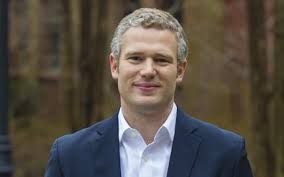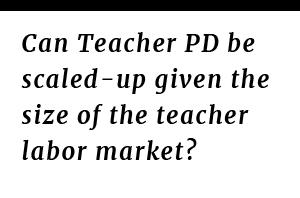The Evidence is In: Teacher Coaching Works but Can it Be Scaled?

In the U.S. and elsewhere, school systems spend tens of billions of dollars annually on teacher professional development (PD) to improve instruction and achievement, with limited results to show for their investments. The weak results of traditional PD programing have generated calls for research to identify specific conditions under which PD programs might produce more favorable outcomes. Coaching has emerged as a promising alternative to traditional models of teacher professional development.
Click here
, to learn about the five principles of effective teaching coaching.
 In a forthcoming paper, my co-authors and I review the causal evidence on teacher coaching programs and explore the question: Can teacher professional development be scaled-up given the size of the teacher labor market? In collecting and analyzing all of the existing studies of K-12 teacher coaching programs in developed countries, we were taken aback to find 60 different studies of coaching programs that evaluated the causal effect of coaching on either teachers' instructional practice and/or students' achievement on standardized tests. A decade ago, one could count on two hands the number of rigorous experimental studies that had been conducted - that evaluated any type of PD program. What we discovered in this research surprised us even more. In a forthcoming paper, my co-authors and I review the causal evidence on teacher coaching programs and explore the question: Can teacher professional development be scaled-up given the size of the teacher labor market? In collecting and analyzing all of the existing studies of K-12 teacher coaching programs in developed countries, we were taken aback to find 60 different studies of coaching programs that evaluated the causal effect of coaching on either teachers' instructional practice and/or students' achievement on standardized tests. A decade ago, one could count on two hands the number of rigorous experimental studies that had been conducted - that evaluated any type of PD program. What we discovered in this research surprised us even more.
Using meta-analytic techniques, we found that coaching models improved teachers' instructional practice by about one half a standard deviation and raised their students' achievement on standardized tests by about a fifth of a standard deviation. These are large effects relative to most other education interventions that have been rigorously tested. At the same time, our analyses
illustrate the challenges of taking coaching programs to scale while maintaining effectiveness. Average effects from evaluations of larger coaching programs were only a fraction of the effects we found in smaller programs that required only a handful of coaches and worked with less than 50 teachers.
Going forward, teacher coaching models can provide a flexible blueprint for continued innovation in teacher PD, but many questions still remain on whether coaching is best implemented as smaller-scale targeted programs or can be taken to scale in a high-quality and cost-effective way.
|
ABOUT
MATTHEW KRAFT
Matthew Kraft is an Assistant Professor of Education and Economics at Brown University. He researches and teaches on topics ranging from the economics of education and education policy analysis to teacher professional growth and school working conditions. His primary work spotlights methods to improve educator and organizational effectiveness in K-12 urban public schools. Kraft details successful models of coaching teachers and the importance of sustained professional development.
|
ABOUT CPRE RESEARCH
The Consortium for Policy Research in Education (CPRE) is a community of researchers from renowned research institutions and organizations committed to advancing educational policy and practice through evidence-based research.
CPRE's mission is to contribute to the output of new, scholarly, evidence-based research.
Our goal is to make education policy research openly accessible to policymakers, practitioners, researchers, and other interested readers.
CPRE's vision is to disseminate research that can be the catalyst for informed decision-making and action in educational policy and practice.
|
CPRE INSTITUTIONS
*CPRE is headquartered at University of Pennsylvania Graduate School of Education, Philadelphia.
|
|
|
New Initiative to Unite Research, Policy, & Practice!
|
 |
 |
NEW!
Emerging Insights into Effective Professional Development
New Cool Thinking on Hot Topics series from CPRE Knowledge Hub explores some of the newest ideas for building educator knowledge and skills. Hosted by CPRE Co-Director
Jonathan Supovitz
(University of Pennsylvania), the series features eight education experts who are currently studying and testing the next generation of breakthroughs in professional development.
The eight-part video series offers viewers the unique prospective on promising areas like coaching, professional networks, and more tightly fusing powerful pedagogical techniques into practice. The series features renown researchers, including
Deborah Ball of the University of Michigan,
Matthew Kraft from Brown University, and
Mary Kennedy and
Ken Frank of Michigan State University; as well as well-known author and educational psychologist
Robert Evans, and district professional development leaders from around the country.
|
 |
 |
 |
 |
CPRE Knowledge Hub (CPRE HUB)
is the Consortium for Policy Research in Education's new initiative to unite education policymakers, practitioners, and researchers in a vibrant, on-line conversational space.
CPRE HUB examines experiences and expertise from leaders across the United States, to further the discussion on policy and practice topics in education and pair discussion with relevant research.
This conversational space features a video and podcast series about critical challenges facing education.
|
|
 |
|